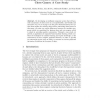82 search results - page 6 / 17 » Explicit Knowledge Programming for Computer Games |
118
click to vote
CG
2008
Springer
15 years 4 months ago
2008
Springer
Abstract. By developing an intelligent computer system that will provide commentary of chess moves in a comprehensible, user-friendly and instructive way, we are trying to use the ...
118
click to vote
ICRA
2010
IEEE
15 years 22 days ago
2010
IEEE
Abstract— We present an integrated vision and robotic system that plays, and learns to play, simple physically-instantiated board games that are variants of TIC TAC TOE and HEXAP...
139
click to vote
SAC
2004
ACM
15 years 7 months ago
2004
ACM
Software applications often contain implicit knowledge in addition to functionality which is inherently object-oriented. Many approaches and systems exist that focus on separating...
124
click to vote
ICFP
2000
ACM
15 years 6 months ago
2000
ACM
We review the close relationship between abstract machines for (call-by-name or call-by-value) λ-calculi (extended with Felleisen’s C) and sequent calculus, reintroducing on the...
118
click to vote
ICALP
1998
Springer
15 years 5 months ago
1998
Springer
An architecture is described for designing systems that acquire and manipulate large amounts of unsystematized, or so-called commonsense, knowledge. Its aim is to exploit to the fu...



